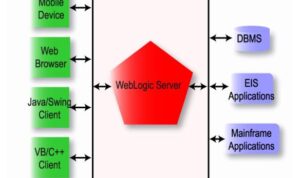Virtual private server hosting opens the door to a world of possibilities for website owners, offering a secure and flexible hosting solution that can elevate online presence. In this guide, we delve into the intricacies of virtual private server hosting, exploring its advantages, setup process, resource management, security measures, and backup strategies.
Get ready to embark on a journey through the realm of virtual private server hosting.
Overview of Virtual Private Server Hosting
Virtual Private Server (VPS) hosting is a type of web hosting where a physical server is divided into multiple virtual servers, each operating independently with its own resources and operating system.
How VPS Differs from Shared Hosting
- Shared hosting involves multiple websites sharing the same server resources, leading to slower performance and potential security risks.
- On the other hand, VPS hosting offers dedicated resources to each virtual server, ensuring better performance, scalability, and security.
Benefits of Using VPS for Hosting Websites
- Improved Performance:With dedicated resources, websites hosted on a VPS experience faster loading times and better overall performance.
- Enhanced Security:Isolation of virtual servers on a VPS reduces the risk of security breaches from other websites sharing the same server.
- Scalability:VPS hosting allows for easy scaling of resources as your website grows, ensuring optimal performance at all times.
- Full Control:Users have more control over their server environment, including the ability to install custom applications and configure settings to suit their needs.
Setting Up a Virtual Private Server
Setting up a Virtual Private Server (VPS) is a crucial step in ensuring a reliable hosting solution for your website or application. Below are the key steps to follow in setting up a VPS.
Choosing the Right Virtual Private Server Hosting Provider
When selecting a VPS hosting provider, consider the following factors:
- Reliability: Ensure the provider has a track record of uptime and reliability to minimize downtime for your server.
- Scalability: Choose a provider that allows you to easily upgrade resources as your website or application grows.
- Security: Look for providers that offer robust security measures to protect your server from cyber threats.
- Support: Opt for a provider with responsive customer support to assist you in case of any issues.
Configuring the Server for Optimal Performance
To configure your VPS for optimal performance, follow these steps:
- Install necessary software: Begin by installing the required operating system and any additional software needed for your website or application.
- Optimize settings: Adjust server settings such as memory allocation, disk space, and bandwidth to meet the requirements of your website or application.
- Implement security measures: Set up firewalls, install SSL certificates, and regularly update software to enhance security.
- Monitor performance: Use monitoring tools to track server performance and address any issues promptly to ensure optimal operation.
Managing Resources on a Virtual Private Server
Managing resources on a virtual private server is crucial for ensuring optimal performance and stability. By effectively allocating CPU, RAM, and storage, monitoring resource usage, and scaling resources based on demand, you can enhance the efficiency of your VPS.
Allocating Resources
- Allocate CPU: Determine the number of CPU cores required for your workload and adjust accordingly. Assign priority to critical applications to ensure they have the necessary processing power.
- Allocate RAM: Calculate the amount of RAM needed based on the applications running on your VPS. Avoid overcommitting RAM to prevent performance issues.
- Allocate Storage: Allocate storage space for data storage, application files, and system resources. Consider the type of storage (SSD or HDD) based on performance requirements.
Monitoring and Managing Resource Usage
- Monitor Resource Usage: Use monitoring tools to track CPU, RAM, and storage utilization. Set up alerts to notify you of resource-intensive processes or potential bottlenecks.
- Optimize Resource Usage: Identify and address resource-intensive applications or processes to optimize performance. Implement resource limits to prevent one application from monopolizing resources.
- Regular Maintenance: Perform regular maintenance tasks such as cleaning up unused files, updating software, and optimizing configurations to keep resource usage in check.
Scaling Resources Based on Demand
- Vertical Scaling: Increase CPU, RAM, or storage capacity of your VPS to handle increased traffic or workload. This involves upgrading your VPS plan or adding more resources.
- Horizontal Scaling: Distribute workload across multiple VPS instances to handle spikes in traffic or resource demands. Implement load balancing to evenly distribute traffic.
- Automated Scaling: Set up auto-scaling configurations to automatically adjust resources based on predefined criteria, such as CPU usage or network traffic.
Security Measures for Virtual Private Servers
Ensuring the security of your virtual private server is crucial to protect your data and prevent cyber attacks. By understanding common security threats and implementing essential measures, you can strengthen the security of your VPS.
Common Security Threats to Virtual Private Servers
Virtual private servers are vulnerable to various security threats, including:
- Malware Infections: Malicious software can compromise the security of your VPS and steal sensitive information.
- DDoS Attacks: Distributed Denial of Service attacks can overwhelm your server, causing downtime and disrupting services.
- Unauthorized Access: Hackers may attempt to gain access to your VPS through weak passwords or unsecured connections.
Essential Security Measures for Virtual Private Servers
To protect your virtual private server from cyber attacks, consider implementing the following security measures:
- Set Up Firewalls: Configure firewalls to monitor and control incoming and outgoing traffic, blocking unauthorized access.
- Implement Encryption: Encrypt data stored on your VPS to prevent unauthorized users from accessing sensitive information.
- Perform Regular Security Audits: Conduct routine security audits to identify vulnerabilities and address any potential security risks.
Backup and Disaster Recovery Strategies
Regular backups are crucial for virtual private servers to ensure data integrity and minimize the risk of data loss in case of unexpected events. Having a solid backup and disaster recovery strategy in place is essential for maintaining the availability of your server and protecting your valuable data.Different backup methods and tools are available for virtual private server hosting, each offering unique features and benefits.
Some common backup methods include:
Backup Methods and Tools
- Full Backup: This method involves creating a complete copy of all data on the server, including operating system files, applications, and user data. It provides a comprehensive backup but may require more storage space and time to complete.
- Incremental Backup: Incremental backups only save changes made since the last full backup, reducing storage space and backup time. However, restoring data may take longer as multiple backup files need to be processed.
- Cloud Backup Services: Utilizing cloud backup services offers off-site storage for your backups, ensuring data redundancy and accessibility even in the event of physical server failure.
- Automated Backup Scripts: Using automated backup scripts can simplify the backup process by scheduling regular backups and automating the backup tasks, reducing the risk of human error.
In addition to backups, disaster recovery strategies are essential to minimize downtime and recover data quickly in case of server failures. Disaster recovery strategies may include:
Disaster Recovery Strategies
- Redundant Servers: Implementing redundant servers can help distribute workloads and ensure continuous availability of services in case of hardware failures or server crashes.
- Data Replication: Setting up data replication across multiple servers can ensure that data is consistently backed up and available in case of server failures or data corruption.
- Emergency Response Plans: Developing emergency response plans that Artikel steps to take in case of server failures can help minimize downtime and ensure a quick recovery process.
- Regular Testing: Regularly testing backup and disaster recovery processes is crucial to ensure that backups are working correctly and data can be restored efficiently in case of emergencies.
Outcome Summary
As we conclude this exploration into virtual private server hosting, it becomes evident that this hosting solution is not just a technological advancement but a strategic tool for businesses and individuals alike. By understanding the nuances of VPS hosting, one can harness its power to enhance website performance, security, and scalability.
Embrace the potential of virtual private server hosting and unlock a world of digital opportunities.
FAQ Compilation
How does virtual private server hosting differ from shared hosting?
Virtual private server hosting provides dedicated resources and greater control over server settings compared to shared hosting, where resources are shared among multiple users.
What are the key factors to consider when choosing a VPS hosting provider?
When selecting a VPS hosting provider, factors such as reliability, scalability, technical support, pricing, and server location should be taken into account.
How can resources like CPU, RAM, and storage be allocated on a VPS?
Resources on a VPS can be allocated through the server's control panel or via command line tools, allowing users to adjust resource allocations based on their needs.
What are some common security threats to virtual private servers?
Common security threats to VPS include DDoS attacks, malware infections, unauthorized access, and data breaches.
Why is regular backup important for VPS hosting?
Regular backups are crucial for VPS hosting to prevent data loss in case of hardware failures, cyber attacks, or accidental deletions.








